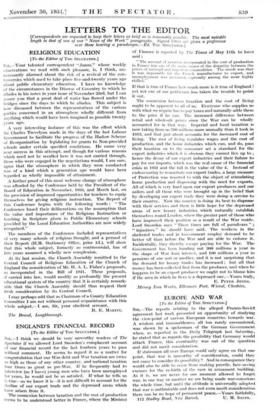ENGLAND'S FINANCIAL RECORD [To the Editor of THE SPECTATOR.] SIR,—I
think we should be very unworthy readers of The Spectator if we allowed Lord Snowden's complacent account of our financial record for the last fourteen years to pass without comment. He seems to regard it as a matter for congratulation that our War debt and War taxation are twice as high as those of any other country, and national taxation four times as great as pre-War. If he frequently had to interview (as I have) young men who have been unemployed for years, he would not be so satisfied. If what he tells us is true—as we know it is—it is not difficult to account for the decline of our export trade and the depressed areas which have arisen from it: The connexion between taxation and the cost of production seems to be understood. better in France, where the Minister of Finance is reported by The Times of May 11th to have said : " The amount. of taxation incorporated in the cost of production in France was one of the main causes of the disparity between the prices of national and imported commodities. The result was that it was impossible for tho French manufacturer to export, and
unemployment was increased, especially among the most highly skilled."
If that is true of France how much more is it true of England ! yet not one of our politicians has taken the trouble to point it out.
The connexion between taxation and the cost of living ought to be apparent to all of us. Everyone who supplies us with what we require has to pay taxes and naturally adds them to the price if he can. The increased difference between retail and wholesale prices since the War can be wholly accounted for in that way. Imperial and local taxation is now taking from us 700 millions more annually than it took in 1913, and that just about accounts for the increased cost of living. The cost of living regulates wages and the cost of production, and the home industries which can, and do, pass their taxation on to the consumer set a standard for the export industries which it is obvious they cannot live up to ; hence the decay of our export industries and their failure to pay for our imports, which was the real cause of the financial crisis in 1931 and the fall in the value of the £. Instead of endeavouring to resuscitate our export trades, a large measure of Protection was resorted to with the object of stimulating home production and dispensing with the need for exports. All of which is very hard upon our export producers and our sailors and all those who were brought up in the belief that by developing our export trade they were doing a service to their country. Now the country is doing its best to dispense with their services and there is little hope for the depressed areas of new luxury industries which naturally establish themselves round London, where the greater part of those who have improved their position as a result of the War reside. Lord Snowden says "These times are full of paradoxes " ; " injustices " he should have said. The workers in the sheltered trades and in Government employ demand to be better off than before the War and are able to enforce it. Incidentally, they thereby escape paying for the War. The Government has been handing out 300 millions a year in the shape of War loan interest, and 100 millions a year in pensions -of one sort or another, and it is not surprising that the demand for luxury trades has increased ; but all that money has been collected first from the producer, and when he happens to be an export producer we ought not to blame him if the area in which he lives is a depressed one.—Yours truly,
E. PETER JONES.
Mersey Iron Trorks, Ellesmere Port, Wirral, Cheshire.










































 Previous page
Previous page